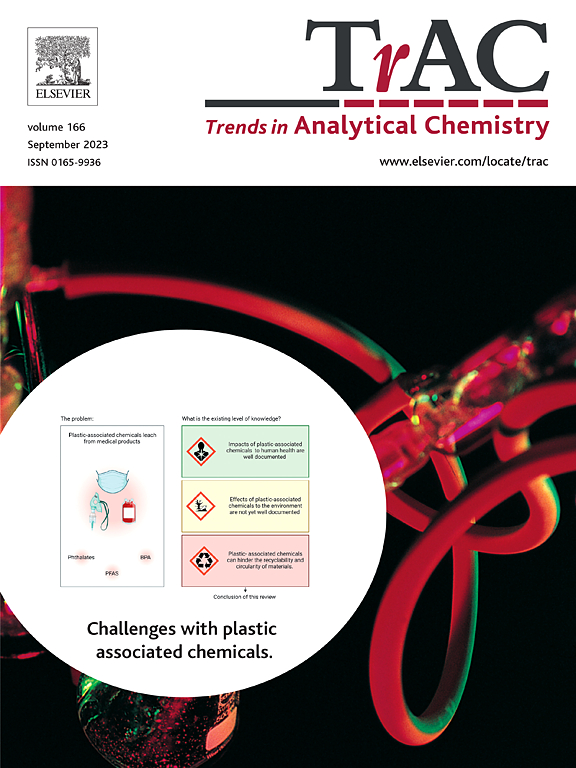液相色谱-质谱在线衍生化研究进展:自动化和性能提升
IF 11.8
1区 化学
Q1 CHEMISTRY, ANALYTICAL
引用次数: 0
摘要
在线衍生化联用液相色谱-质谱(LC-MS)已成为分析复杂样品中目标化合物的有力方法。它提高了可检测性、分离效率、灵敏度、选择性和整体数据质量,特别是对弱电离分析物。通过自动化样品预处理和分析,它增加了吞吐量、再现性,并减少了时间、劳动力和成本。各种在线衍生策略,包括柱前、柱上和柱后方法,已经开发出来,每个都有独特的配置和应用。尽管有重要的研究,但现有的综述通常侧重于离线衍生化或试剂等特定方面,在全面覆盖方面存在空白。本文概述了最近的在线衍生化方法,讨论了它们的优点、缺点、应用,并为不同场景选择最合适的技术提供了指导。本文章由计算机程序翻译,如有差异,请以英文原文为准。
Advances in online derivatization for liquid chromatography-mass spectrometry: Automation and performance enhancement
Online derivatization coupled with liquid chromatography-mass spectrometry (LC-MS) has become a powerful method for analyzing target compounds in complex samples. It improves detectability, separation efficiency, sensitivity, selectivity, and overall data quality, particularly for weakly ionizable analytes. By automating sample pretreatment and analysis, it increases throughput, reproducibility, and reduces time, labor, and costs. Various online derivatization strategies, including pre-column, on-column, and post-column methods, have been developed, each with unique configurations and applications. Despite significant research, existing reviews typically focus on specific aspects like offline derivatization or reagents, leaving gaps in comprehensive coverage. This article provides an overview of recent online derivatization approaches, discussing their advantages, disadvantages, applications, and offering guidance for selecting the most suitable techniques for different scenarios.
求助全文
通过发布文献求助,成功后即可免费获取论文全文。
去求助
来源期刊

Trends in Analytical Chemistry
化学-分析化学
CiteScore
20.00
自引率
4.60%
发文量
257
审稿时长
3.4 months
期刊介绍:
TrAC publishes succinct and critical overviews of recent advancements in analytical chemistry, designed to assist analytical chemists and other users of analytical techniques. These reviews offer excellent, up-to-date, and timely coverage of various topics within analytical chemistry. Encompassing areas such as analytical instrumentation, biomedical analysis, biomolecular analysis, biosensors, chemical analysis, chemometrics, clinical chemistry, drug discovery, environmental analysis and monitoring, food analysis, forensic science, laboratory automation, materials science, metabolomics, pesticide-residue analysis, pharmaceutical analysis, proteomics, surface science, and water analysis and monitoring, these critical reviews provide comprehensive insights for practitioners in the field.
 求助内容:
求助内容: 应助结果提醒方式:
应助结果提醒方式:


